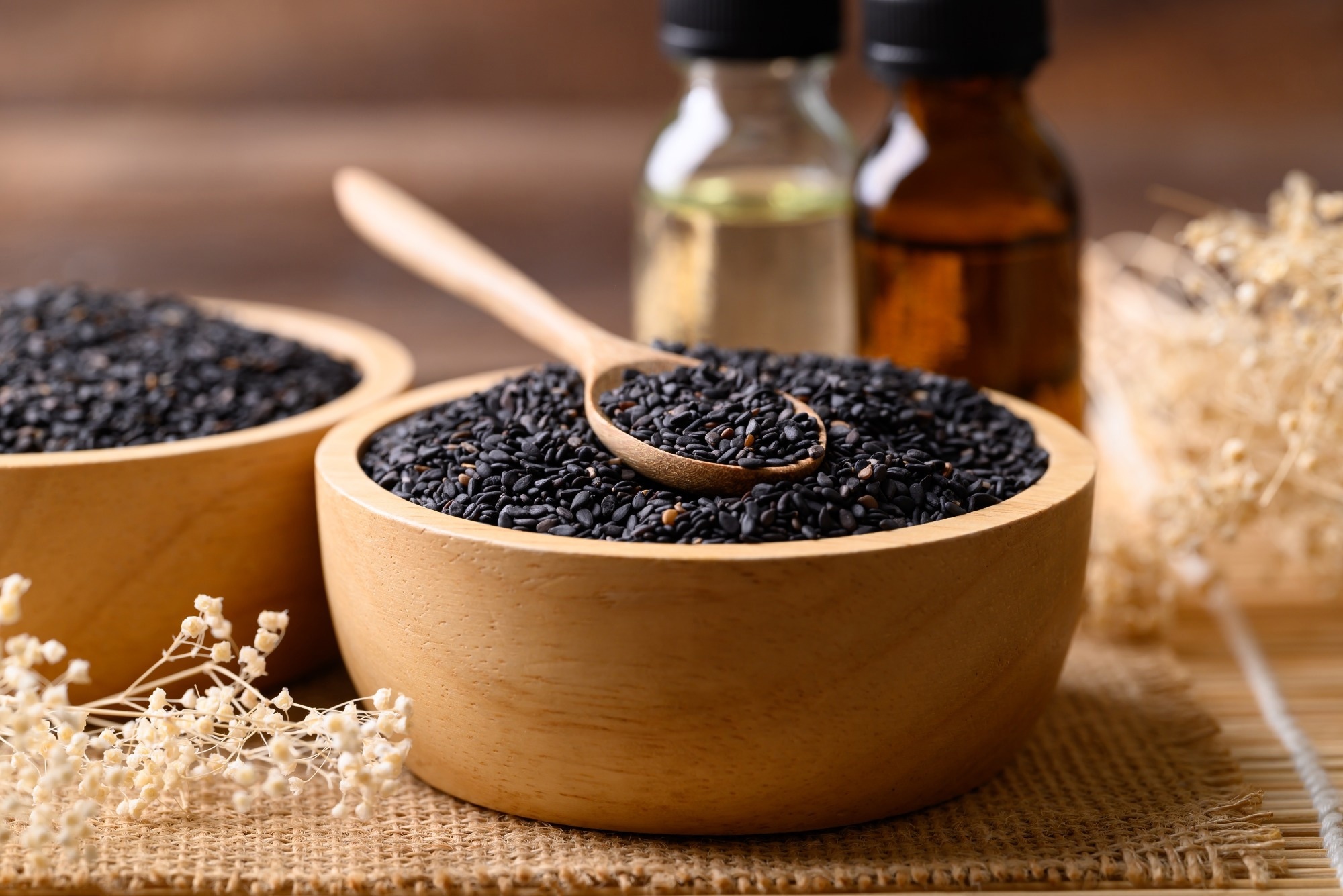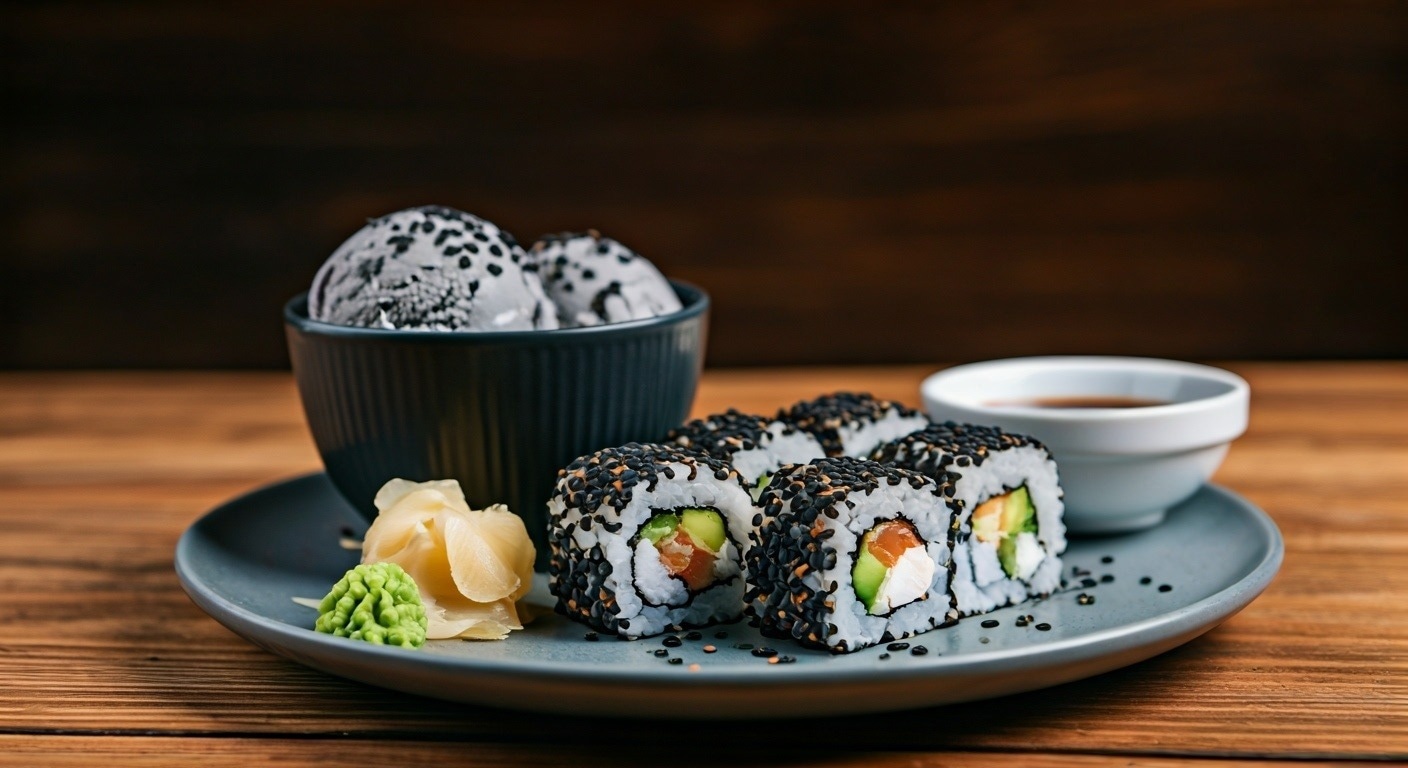Introduction
What are Black Sesame Seeds?
Nutritional Profile
Health Claims and Scientific Evidence
Improved Heart Health
Antioxidant and Anti-Inflammatory Activity
Hair and Skin
Ways to Eat Black Sesame
Safety, Allergies, and Considerations
Final Thoughts
References
Discover how black sesame seeds, celebrated for centuries in traditional medicine, are gaining scientific attention for their powerful nutritional profile and potential to boost overall health.
 Image Credit: Nungning20 / Shutterstock.com
Image Credit: Nungning20 / Shutterstock.com
Introduction
In recent years, there has been a marked shift in global dietary preferences from purely indulgent to more nutritionally aware choices driven by a growing awareness of health and nutrition. This evolution has fueled a growing market for functional foods that offer health benefits beyond basic nutrition, often due to their natural ingredients.
Among these natural food products is black sesame, a versatile ingredient that has transitioned from traditional Asian kitchens to modern wellness stores. Rich in bioactive compounds like fatty acids, lignans, and polyphenols, black sesame seeds are emerging as a star in the world of functional foods.1,2,5,6
What are Black Sesame Seeds?
For centuries, traditional Chinese medicine (TCM) has revered black sesame for its ability to enhance hair vitality, support liver and kidney function, nourish the blood, and promote digestive health. Black sesame seeds are small, flat, and oval-shaped seeds distinguished by their deep black color and rich, nutty flavor.
Predominantly cultivated in China, India, Pakistan, Tanzania, and Sudan, black sesame seeds are often incorporated in Asian, Middle Eastern, and African meals.2 In addition to their culinary uses, black sesame seeds are celebrated in traditional Chinese medicine as a tonic for hair health, liver and kidney nourishment, blood fortification, and slowing the aging process.
In Ayurvedic practices, black sesame seeds are valued for their purifying properties and are often incorporated into hair and skin treatments.
Nutritional Profile
Black sesame seeds are a rich source of protein, lipids, minerals, and black pigment. These seeds are rich in carbohydrates, fat-soluble vitamin E, and secondary metabolites such as lignans, saponins, and flavonoids, all of which improve heart health, regulate metabolism, and support cell function.
Two tablespoons of black sesame seeds contain approximately three to four grams of monounsaturated fatty acids (MUFAs) and polyunsaturated fatty acids (PUFAs), both of which are considered healthy fats. Black sesame seeds are also rich in protein and fiber, in addition to several minerals, including calcium, magnesium, phosphorus, copper, zinc, and iron.
In comparison to white sesame seeds, black sesame seeds have a higher concentration of phenolic compounds and essential nutrients, including calcium, iron, and magnesium. Black sesame seeds are rich in vitamins B1, B6, and E, as well as lignans such as sesamin, sesamolin, sesamol, sesaminol, sesamolinol, and pinoresinol, which function as antioxidants by mitigating oxidative stress.1,5
Health Claims and Scientific Evidence
Research suggests that black sesame seeds can promote hair growth and reduce greying, strengthen bones, improve skin elasticity, and enhance moisture retention. Black sesame seeds also contribute to improved heart health by lowering blood pressure and cholesterol levels, while providing protective benefits for the liver and kidneys.5,6
Improved Heart Health
The lignans in black sesame are associated with lower total cholesterol (TC), low-density lipoprotein (LDL), and triglycerides (TG) levels, all of which simultaneously reduce the risk of cardiovascular disease.1,2,5
In one study, hypertensive individuals who consumed 2.5 grams of black sesame seeds daily experienced a 6% reduction in systolic blood pressure within one month, compared to the placebo group.Similarly, a 2012 study reported that, among 38 individuals with elevated blood lipids who consumed 40 grams of hulled sesame seeds daily for two months, a 10% reduction in LDL cholesterol levels and an 8% reduction in triglyceride levels were observed, respectively, compared to the placebo group.7 Moreover, a systematic review on the effects of sesame seeds on blood pressure found that five out of seven clinical studies observed significant improvements in blood pressure.8
Antioxidant and Anti-Inflammatory Activity
Animal experiments and human studies suggest that eating sesame seeds may increase blood antioxidant levels.5,6 In an eight-week in vivo study, mice consuming 1-2 mL/kg of a black sesame seed daily improved insulin resistance by lowering serum glucose and insulin levels, as well as reducing liver inflammation and fat accumulation.3
Similar results were reported in a clinical trial, during which 30 individuals who were provided capsules containing 2.5 grams of black sesame seeds daily for four weeks exhibited a significant reduction in malondialdehyde (MDA) levels, a common marker of oxidative stress.9 In another cohort of kidney disease patients, 18 grams of flax seeds with six grams of pumpkin and sesame seeds daily for three months reduced inflammatory markers by 51-79%.8
Hair and Skin
Anecdotal evidence and TCM literature recommend black sesame for preventing hair graying and enhancing skin tone; however, scientific evidence for these claims remains limited. A 2011 study reported that sesame oil could prevent the absorption of up to 30% of ultraviolet (UV) rays that cause sunburns, wrinkling, and early skin aging.9
Another study on 40 individuals treated in the emergency department for trauma found that massaging wounded extremities with sesame oil significantly reduced pain.10 Importantly, these studies were conducted in small cohorts of patients, which necessitates additional long-term clinical trials to validate the findings.
Ways to Eat Black Sesame
Bakers use black sesame to garnish handcrafted bread, sticks, rolls, biscuits, buns, and crackers. Black sesame seeds are also popular in international dishes like tahini, which is a staple ingredient in Mediterranean dressings, desserts, or spreads. Black sesame seeds are also used when preparing halvah, a Middle Eastern confection made by grinding sesame seeds together with other minor products. In East Asia, sesame balls and ice cream are popular desserts.1,2
 Image Credit: Shutterstock AI Generator / Shutterstock.com
Image Credit: Shutterstock AI Generator / Shutterstock.com
Black sesame seeds can be toasted and sprinkled on salads, rice, or vegetables, or blended into creamy, nutty beverages. Sesame is a major ingredient in hummus, a dip made from chickpea flour and sesame paste. Sesame oil is also drizzled to flavor foods and drinks.
Available as capsules, powders, or oils, black sesame supplements promise convenience and concentrated benefits. However, the bioavailability of the nutrients present in sesame seeds can vary, with some studies suggesting that ground seeds or oil extracts may offer better absorption than whole seeds due to the tough seed coat.
Safety, Allergies, and Considerations
Sesame is a major allergen in many countries, causing individuals with allergies to experience a range of mild to severe reactions. Sesame seed consumption may not be advisable for individuals prescribed blood pressure-lowering or blood-thinning medications. Black sesame seeds are also high in calories and fat; therefore, consuming excessive amounts may lead to gastrointestinal problems or weight gain.
Final Thoughts
Whether sprinkled over a meal, blended into a latte, or taken as a supplement, black sesame seeds are a delicious and nutrient-dense way to boost heart, liver, kidney, brain, and skin health. With its impressive nutritional profile and potential health benefits, black sesame seeds are a testament to the enduring wisdom of traditional practices blended with modern nutritional science.
References
- Hoyos, B.E.; Johnson, J.B.; Mani, J.S.; Batley, R.J.; Trotter, T.; Bhattarai, S.P.; Naiker, M. (2024). The Effect of Water Stress on Bioactive Compounds in Australian-Grown Black Sesame. Plants. 13, 793, DOI:10.3390/plants13060793, https://www.mdpi.com/2223-7747/13/6/793
- Lin Zhou, Xiaohui Lin, Arshad Mehmood Abbasi, and Bisheng Zheng (2016). Phytochemical Contents and Antioxidant and Antiproliferative Activities of Selected Black and White Sesame Seeds. BioMed Research International. Article ID 8495630, 9 pages, DOI:10.1155/2016/8495630, https://onlinelibrary.wiley.com/doi/10.1155/2016/8495630
- Yang Yang, Jingjing Wang, Yongmin Zhang, Jing Li, Wenji Sun. (2018). Black Sesame Seeds Ethanol Extract Ameliorates Hepatic Lipid Accumulation, Oxidative Stress, and Insulin Resistance in Fructose-Induced Nonalcoholic Fatty Liver Disease. Journal of Agricultural and Food Chemistry. 66 (40), 10458-10469, DOI:10.1021/acs.jafc.8b04210, https://pubs.acs.org/doi/10.1021/acs.jafc.8b04210
- BLACK SESAME SEEDS, USDA FoodData Central, Accessed on 30 May 2025, https://fdc.nal.usda.gov/food-details/703474/nutrients
- Dandan Wang et al. (2018). Identification of Nutritional Components in Black Sesame Determined by Widely Targeted Metabolomics and Traditional Chinese Medicines. Molecules. 23, 1180; DOI:10.3390/molecules23051180, https://www.mdpi.com/1420-3049/23/5/1180
- Wichitsranoi J, Weerapreeyakul N, Boonsiri P, et al. (2011). Antihypertensive and antioxidant effects of dietary black sesame meal in pre-hypertensive humans. Nutr J. 10:82. DOI: 10.1186/1475-2891-10-82, https://nutritionj.biomedcentral.com/articles/10.1186/1475-2891-10-82
- Alipoor, B., Haghighian, M. K., Sadat, B. E., & Asghari, M. (2012). Effect of sesame seed on lipid profile and redox status in hyperlipidemic patients. International Journal of Food Sciences and Nutrition. 63(6), 674–678, DOI:10.3109/09637486.2011.652077, https://www.tandfonline.com/doi/full/10.3109/09637486.2011.652077
- Ristic-Medic D, Perunicic-Pekovic G, Rasic-Milutinovic Z, Takic M, Popovic T, Arsic A, Glibetic M. (2014). Effects of dietary milled seed mixture on fatty acid status and inflammatory markers in patients on hemodialysis. Scientific World Journal. 563576. DOI:10.1155/2014/563576, https://onlinelibrary.wiley.com/doi/10.1155/2014/563576
- Korać RR, Khambholja KM. (2011). Potential of herbs in skin protection from ultraviolet radiation. Pharmacogn Rev.;5(10):164-73. DOI:10.4103/0973 7847.91114, https://www.phcogrev.com/article/2011/5/10/1041030973-784791114
- Nasiri M, Farsi Z. (2017). Effect of light pressure stroking massage with sesame (Sesamum indicum L.) oil on alleviating acute traumatic limbs pain: A triple-blind controlled trial in emergency department. Complement Ther Med. 32:41-48. DOI: 10.1016/j.ctim.2017.03.004, https://www.sciencedirect.com/science/article/abs/pii/S0965229917301620
Last Updated: Jun 4, 2025